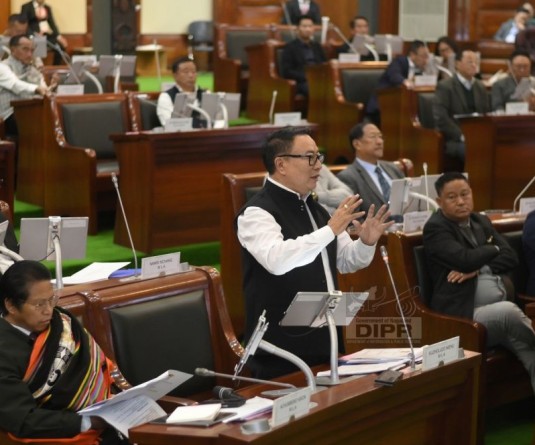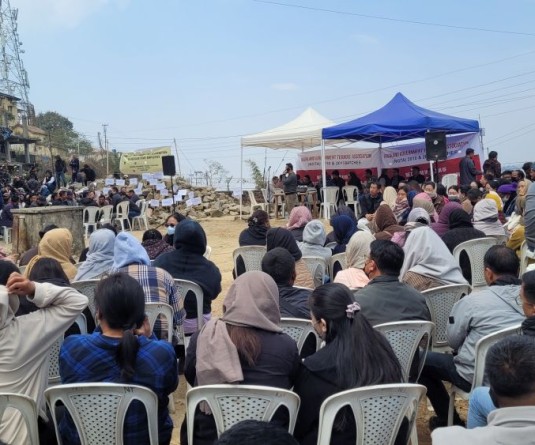
DIMAPUR, SEPTEMBER 22 (MExN): Nagaland State Chief Minister, TR Zeliang today emphasized on the importance of rail and road connectivity in the North East to boost trade and commerce in the border areas and with the Southeast Asian countries.
He was addressing the Northeast Connectivity Summit this morning at Agartala, Tripura on the theme ‘Connect Northeast, 2016,’ which was organized by the Federation of Indian Chamber of Commerce and Industry and supported by the Government of Tripura, Ministry of DONER and NEC.
Commenting on the topic of ‘Seamless Border Trade with Bangladesh and Southeast Asia,’ Zeliang said the fencing of border areas in the North East may not find as much logic as it does in border areas with Pakistan and parts of Bangladesh, since in the case of Nagaland “the international boundary does not follow a river or other convenient landmarks” but rather, based on the “watershed principles.”
He pointed out the case of the house of the Angh in Longwa village in Mon district where half of it lies in India and the other half in Myanmar.
“In fact, what we need is not barbed wire fencing, but construction of roads along and across the borders so as to “unlock the land-locked areas”, and promote trade and development, Zeliang said. He went on to opine that in the absence of road and communication, it makes “these areas the perfect hiding grounds for insurgents.” Zeliang was also critical of the restrictions imposed by the Ministry of Defence and Home Affairs on construction of roads and development activities within an aerial distance of 25kms due to security concerns.
“In the hilly terrains of India Myanmar border, an aerial distance of 25 km from the border can mean a lot. Some sub-divisional and block head quarters are actually located within such distance,” he said and added that many roads constructed under various centrally sponsored schemes are within such distances.
Meanwhile, lamenting that there are still vast gaps to be filled in infrastructure, Zeliang said if border trade and people to people connectivity were to be improved in the region, the first priority should be construction of quality highways and railways connecting the region “with the mainland on the one hand, and with the neighbouring Southeast Asian countries on the other”.
Zeliang opined the geographical location of the region will become central and strategic in terms of international trade and development, and went to suggest that the Government of India’s Act East Policy should aim to bring this about. “The most practical and convenient road and rail connectivity between India and the Southeast Asian countries should run through Kohima to Moreh via Imphal,” the Nagaland CM said and reminded that the historic battle of Kohima during WWII was fought for control of this strategic route that would have provided Japanese forces to enter the plains of India.
Zeliang also made a strong plea that the east-west corridor which presently ends at Silchar in Assam should be extended from Doboka to Moreh via Kohima and Imphal, pointing out that a highway already connects Moreh with Kuala Lampur. He also suggested that the railway line should run more or less with this alignment, and appealed for a re-look by the Government of India into the broad gauge line from Diphu (Dhansiri) to Karong (Manipur), the foundation stone for which was laid by Nitish Kumar in 1998 but “due to some inexplicable political consideration” was abandoned. He pointed out that this route would be shorter by 125km to connect with Southeast Asian countries.
Zeliang also pointed out the shortage of power supply in the region and underlined the need for not only adequate power generation but efficient transmission and distribution.
Improve internet connectivity
Zeliang also emphasized on the need for better internet connectivity in the region to enable the North East people to fully participate as equal partners in building regional value chain.
He urged the government of India to expedite the proposal to bring broadband internet network to the region through Cox Bazaar in Bangladesh so as not to “deprive the English –speaking and internet-savvy youth of the North East from effectively utilizing the global internet highway for educational and business purposes.”
Delegates from Bangladesh and Bhutan as well as from all the Northeastern States attended the Summit. The fourth edition of the Summit scheduled for September 21-23-2017 is to be held in Nagaland and accordingly Nagaland Chief Minister has extended invitation to all delegates to attend the Nagaland edition of the summit.
Tripura and Nagaland CMs slam centre for abolishing Plan Panel
Agartala, SEPTEMBER 22 (PTI): Chief Ministers of the North Eastern region, T R Zeliang and Manik Sarkar, today criticised the central government for abolishing the Planning Commission and forming NITI Aayog.
“All the North Eastern states are facing problems of money after abolishing of the Planning Commission and forming NITI Aayog,” Zeliang, Chief Minister of Nagaland, said.
“Every state is now losing money because it is not clear how the plans would be finalised and implemented. All the states in the region were facing crisis of funds in implementing projects,” he said.
During the time of the Planning Commission, there was a scope for discussion between the state government and the Commission for finalising the plan outlay, but this scope has faded away, Tripura Chief Minister Manik Sarkar said. “For the last 28 months after NITI Aayog was formed, there has been no discussion between it and Tripura government regarding planning,” Sarkar said, adding Tripura was losing over Rs 1800 crore per year after formation of the Aayog.
Zeliang and Sarkar were addressing a three-day business summit, jointly organised by FICOS and the Tripura government, on connectivity of the North-East and opportunities in international trade and commerce.






